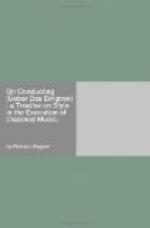A large part of their education has ever since consisted in learning to watch their behaviour, and to suppress any indications of passion; much as one who naturally lisps and stammers, is careful to keep quiet, lest he should be overcome by a fit of hissing and stuttering. Such continuous watchfulness has assisted in the removal of much that was unpleasant, and the general humane amalgamation has gone on much more smoothly; which, again, has brought it about that many a stiff and poorly developed element of our home-growth has been refreshed and rejuvenated. I have already mentioned that amongst musicians roughness of speech and behaviour are going out, that delicate details in musical execution are more carefully attended to, etc. But it is a very different thing to allow the necessity for reticence, and for the suppression of certain personal characteristics, to be converted into a principle for the treatment of our art! Germans are stiff and awkward when they want to appear mannerly: But they are noble and superior when they grow warm. And are we to suppress our fire to please those reticent persons? In truth, it looks as though they expected us to do so.
In former days, whenever I met a young musician who had come in contact with Mendelssohn, I learnt that the master had admonished him not to think of effect when composing, and to avoid everything that might prove meretriciously impressive. Now, this was very pleasant and soothing advice; and those pupils who adopted it, and remained true to the master, have indeed produced neither “impression nor meretricious effect;” only, the advice seemed to me rather too negative, and I failed to see the value of that which was positively acquired under it. I believe the entire teaching of the Leipzig Conservatorium was based upon some such negative advice, and I understand that young people there have been positively pestered with warnings of a like kind; whilst their best endeavours met with no encouragement from the masters, unless their taste in music fully coincided with the tone of the orthodox psalms. The first result of the new doctrine, and the most important for our investigations, came to light in the execution of classical music. Everything here was governed by the fear of exaggeration (etwa in das Drastische zu fallen). I have, for instance, hitherto not found any traces that those later pianoforte works of Beethoven, in which the master’s peculiar style is best developed, have actually been studied and played by the converts to that doctrine.




